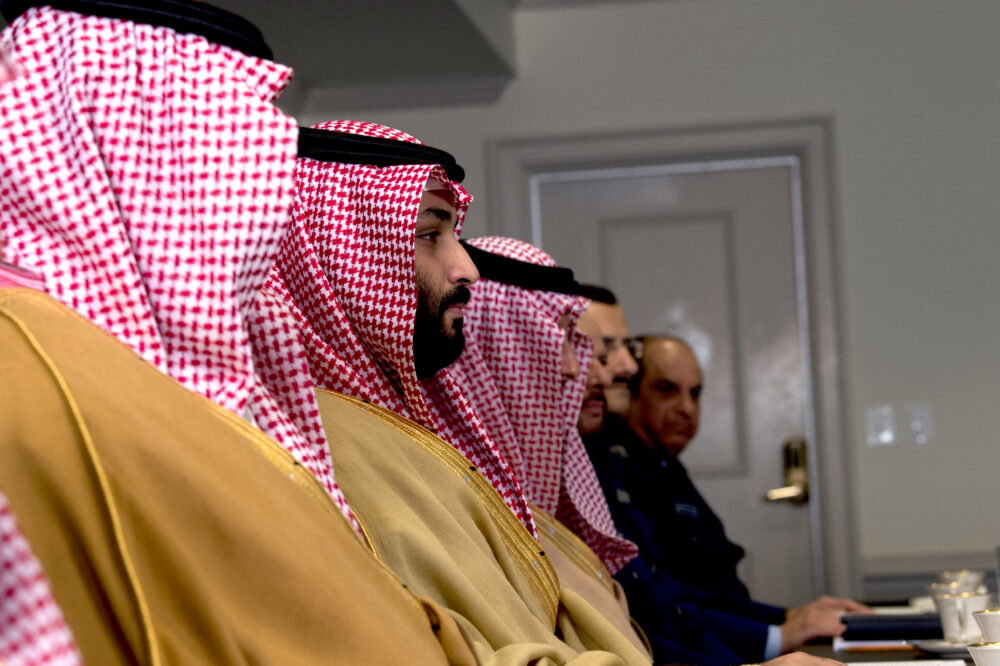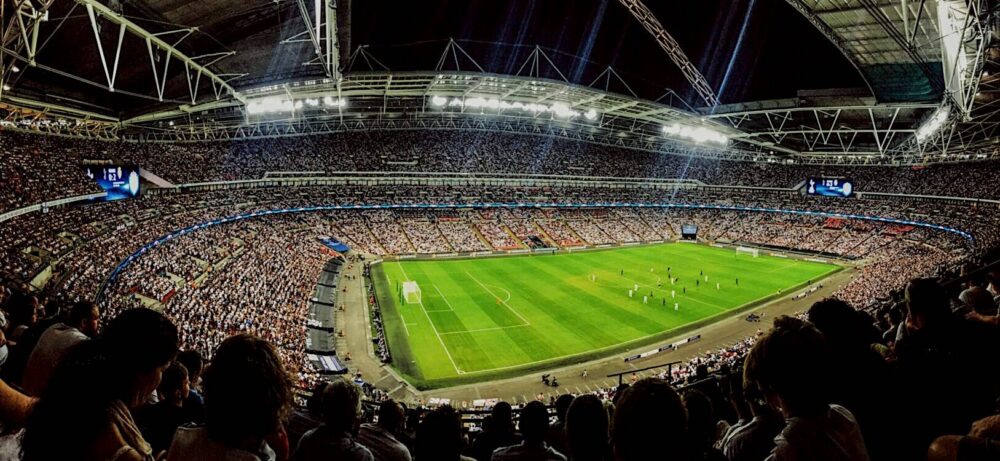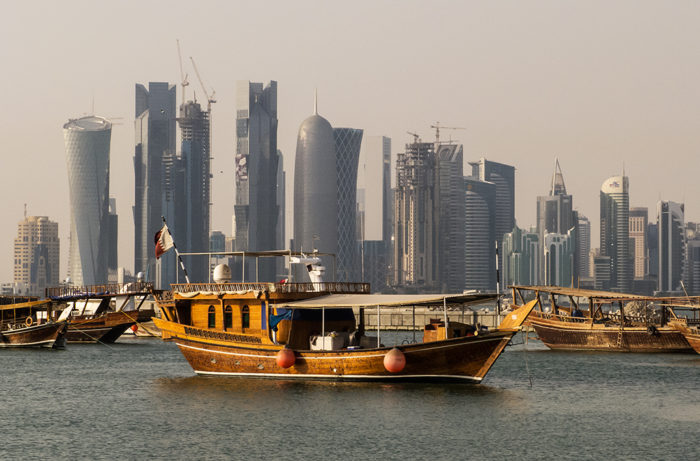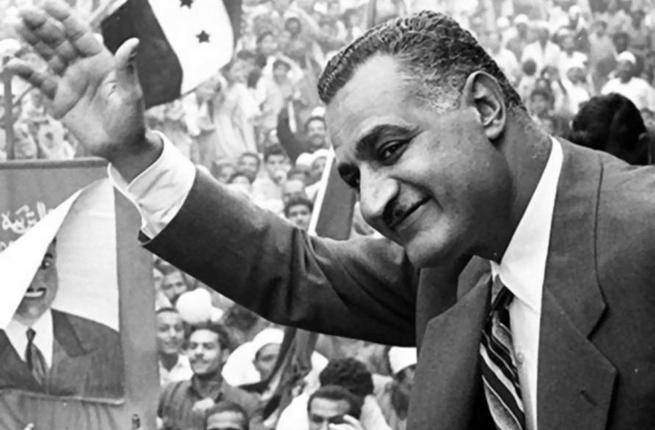The first World Cup to be held in an Arab land has sparked a resurgence of Arab nationalism, support for Palestine and rejection of the Abraham Accords, writes As’ad AbuKhalil.
By As`ad AbuKhalil
Special to Consortium News

Arabs have re-discovered themselves as one people in Doha, Qatar during the ongoing World Cup. Morocco’s surprise run to the semi-finals has only intensified the renewed feeling of Arab unity, which is trending on social media across the region.
The Arabs — in the age following the death of Nasser in 1970 — were made to feel separate and apart from one another. Western governments and their Gulf clients fought all manifestations of Arab nationalism and thwarted all attempts at Arab unity. The agenda was to divide Arabs along sectarian, ethnic, and national lines.
This is no conspiracy theory. The U.S. vision for the region was displayed in full force in Iraq after its invasion by the U.S. in 2003. Iraq, since early in the 20th century the center for Arab nationalist activities and thought, was splintered with the U.S. replicating there Lebanon’s corrupt sectarian system.
Sectarianism was never a facet of Iraq prior to the U.S. invasion. Some U.S. politicians, like Joe Biden and Anthony Blinken, were not satisfied with the fragmentation of Iraq that was achieved under U.S. occupation; they actually argued for an official division of Iraq into 3 separate enclaves defined by sect and ethnicity.
An unmistakable Arab nationalist message (within the parameters of Qatari foreign policy) was allowed by Qatar to be broadcast on it flagship news network, Aljazeera, since its inception in 1996.
But that plan shifted after 2011 when Qatar and Aljazeera became unabashed promoters of the Muslim Brotherhood and its religiopolitical agenda. Aljazeera lost its pan-Arab appeal and its news coverage changed drastically to accommodate U.S. concerns about the “anti-American tone” of its coverage.
Qatar’s World Cup Gamble
Qatar lobbied feverishly to host the World Cup and there were stories of corruption that accompanied the Qatari quest. This happened when there was a deep rift in the relationship between Qatar on the one hand, and Saudi Arabia and UAE on the other.
Saudi Arabia and the UAE were building a solid alliance with Israeli (overt in the case of UAE and covert in the case of Saudi Arabia) while Qatar was attempting to distinguish its foreign policies from its two rival countries.
Qatar, which pioneered normalization with Israel in the late 1990s, came to slow down and restrain that path when it posed as a champion of the Palestinians and as a sponsor of the Hamas movement.
Qatar defines its identify very much in relation to Saudi Arabia: when Qatar normalized with Israel, Saudi Arabia abstained; and when Saudi Arabia started to build strong ties with Israel, Qatar drifted away from the normalization path. It did so while serving as a generous and unconditional host of U.S. troops in Qatar.
Qatar gambled big in this World Cup: it adhered to FIFA rules to allow Israeli journalists and fans to cover and watch the games while allowing Palestinian political manifestations and chants to reverberate throughout the games.
Impact on Palestine
The rediscovered Arab unity is having an impact on Palestine. Despite Arab Gulf attempts at suppressing news of Israeli violations of Palestinian human rights, every act of murder by Israel is covered widely on Arab social media.
By contrast, Saudi and UAE newspapers now bring up positive stories about Israel in order to sway Arab public opinion away from rejection of normalization with Israel.
Support CN’s Winter Fund Drive!
Whenever there is a flareup in Israeli bombings of Palestine, Arabs flock to social media and express outrage and indignation and circulate images and pictures.
Their outrage and indignation are often met with corporate censorship which is coordinated at the highest level between Israeli prime ministers and heads of media and tech giants — as we learned from the recently released memoirs of Benjamin Netanyahu.
Arabs were not surprised to see the extent to which the Palestinian cause prompts Arabs to rally around their central cause which has come to define what being an Arab is.
Moroccan athletes and fans have significantly been among the most vocal in expressing support for the Palestinians, despite the peace deal between the Moroccan monarch and Israel. A Palestinian friend who visits Morocco regularly reports to me that the Moroccan people express great excitement even upon meeting Palestinians in their country and that most athletic events display support for Palestine.
For its support for Israel, the UAE regime must be embarrassed among its people and especially among Arabs at large. Muhammad bin Zayid, the UAE despot, is not another Nasser and does not speak for anyone in the region beyond the confines of his ruling family.
What is most significant about the display of Palestinian nationalist fervor is that the socio-economic background of Arab sports fans in Doha is quite affluent (average Arabs can’t afford to travel to Doha and stay in hotels to watch the games). The display of pro-Palestinian political sentiments must have surprised all those who were behind the Abraham Accords.
NYT Notices
Even The New York Times took notice, at long last: the Arab people oppose normalization with Israel.
Western media shouldn’t be surprised if they had been doing their job properly of covering the mood and attitudes of the Arab public. But Western media rarely hire correspondents who know Arabic and who can report accurately about Arab political debates. Vivien Yee of The New York Times, for instance, knows neither Arabic nor Persian and has never studied the Middle East, but she is now covering Iranian protests because she covered Beirut before.
As Netanyahu explained fully in his memoirs (I will return to his memoirs in a subsequent column for Consortium News), it was Israel which engineered the Abraham Accords and, according to a firm belief among the Israeli right, if you ignore the Palestinian problem it will simply go away.
Netanyahu and others believe that if you assume that Arab despots represent the Arab people, then peace deals with those despots can be marketed as peace deals with the Arabs themselves.
Ironically, Israel over the decades, railed against Arab despots when their rhetoric was hostile toward Israel (actually the rhetoric of Gulf despots especially in Saudi Arabia was anti-Jewish); and now Israel realizes that the preservation of Arab despotism is the only guarantee for Israeli peace treaties with Arab governments.
What the Saudis Think

Saudi Crown Prince Mohammed bin Salman, MbS, at the Pentagon in Washington, D.C, in 2018. (DoD, Kathryn E. Holm)
It is certain that Israel knows that the despots don’t represent the Arab people regarding Israel. Even the AIPAC-affiliated Washington Institute for Near East Policy (WINEP) conducted a public opinion survey in Saudi Arabia, which showed that the locals there don’t support normalization with Israel.
Of course, WINEP put its own spin on the results, which are suspect in any case because the Saudi government arranges for the local polling of its citizens under its own constraints. In Lebanon, the freest of all Arab countries, “The percentage of those in Lebanon who see them [the Abraham Accords] in a ‘very negative’ light has increased from 41% in November 2020 to 66% this March,” WINEP reported.
Some Arab leaders have figured this out. The UAE government realized that opposition to normalization with Israel is an added political asset to any sitting Arab ruler or government. The current president of Tunisia won the presidency largely on the basis of his categorical and eloquent rejection of normalization with Israel.
The UAE is now closely affiliated with the Israeli government and its destructive policies toward the Palestinians. The Palestinians today are the underdogs of the Arab world and sympathy for their plight runs deep among the Arab population.
The one ruler who must have noticed pro-Palestinian “noise” in Qatar is Muhammad bin Salman, who is waiting for the right bargain to sign a peace treaty with Israel.
Short of full-fledged American support for his coronation, he will hold off on normalization especially since Muslim countries like Pakistan and Indonesia have thus far resisted UAE-Saudi pressure to normalize. The Saudi public has been known for its support for Palestine and MbS can’t afford to alienate his population any further.
Qatar is not a purist on normalization. It maintains secret contacts with the Israeli government and Mossad directors are welcome in Doha. But Qatar knew how to extract political benefits from hosting the games.
Now Arab governments know that the rules of the 1950s still apply: any ruler who chants for Palestine will earn political credit among his own people and among Arabs across the region.
As`ad AbuKhalil is a Lebanese-American professor of political science at California State University, Stanislaus. He is the author of the Historical Dictionary of Lebanon (1998), Bin Laden, Islam and America’s New War on Terrorism (2002) and The Battle for Saudi Arabia (2004). He ran the popular blog The Angry Arab and tweets as @asadabukhalil
The views expressed are solely those of the author and may or may not reflect those of Consortium News.
Support CN’s
Winter Fund Drive!
Or securely by credit card or check by clicking the red button:





Obviously, “Normalization,“ can be enlightening; &, oh, so Spot Flippn’ On!!
Exhibit A-Z: “The first World Cup to be held in an Arab land has sparked a resurgence of:
– Arab nationalism,
– Support for Palestine; and,
– Rejection of the Abraham Accords.” (As’ad AbuKhalil)
“AND, The Stadium in Qatar has been built using 974 Recycled Shipping Containers. The STADIUM was named ‘974’ as it is the exact number of shipping containers used to build the venue while also being the Gulf’s country’s international dialing code.” hxxps://www.ndtv.com/world-news/fifa-world-cup-this-stadium-in-qatar-has-been-built-using-974-recycled-shipping-containers-3581100
Whatabout, AMERICA’s NORMAL? What’s it look like?
What “NORMALIZATION” of the past Two (2) years of “progress” in The Divided $tates of Corporate America, looks like:
– NORMAL is BIDEN-HARRIS, a demented, perverted, deranged, unhinged POTUS & V.P.
– NORMAL is CONGRESS’ flagrant dereliction of duty, i.e., indicting & prosecuting despots/war criminals
– NORMAL is the Virus & its Variants, Omicron aka Moronic
– NORMAL is Herd Immunity
– NORMAL is perpetual WAR
– NORMAL is MASS Death per Viruses, Diseases, Despots’ WARS
– NORMAL is War & Hate, of Countries, Cultures, People, miles away.
RAGE is the appropriate attitude; but, I digress. To the MATCH, France vs. Morocco. No f/doubt about it, a best match, ending in France-3, Morocco-0. IMO, coulda, shoulda, woulda easily ended in a 4-3, MOROCCO takes all; IF, the SHOTS Morocco rocked, woulda hit the back of the Net; NOT the f/Post. Ugh. “UNLUCKY, LADS!”
France vs. Morocco is exactly what The World Cup is about, the Heart & Bones, of premier, World Class champions/athletes. It’s World Class Futbol/Soccer!!!
Onwards & Upwards to Sunday, 12.18.22, The Universe will be watching, ARGENTINA v. France!!!
I am surprised to see that nobody has commented on the fascinating observations yet.
These observations jive with what I have been feeling based on my interactions related to the World Cup with a friend from Sudan. I seem to detect a pan African feeling as well, albeit somewhat more muted. I think that these pan Arabic (and pan African) feeling is also propelled by a general disgust at western wokeism by the “global south”.